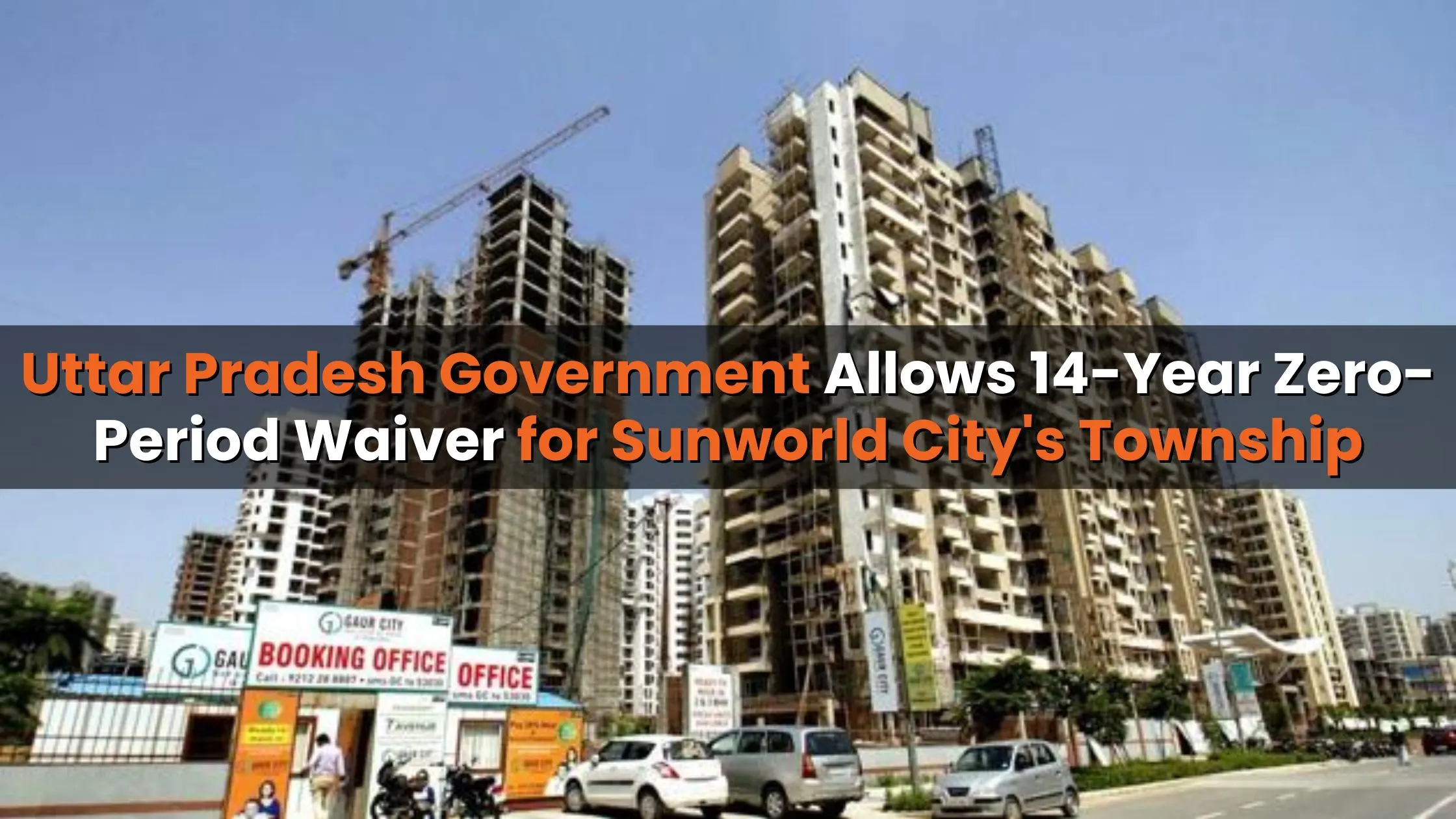Table of Content
▲
In a major policy move aimed at resolving long-stalled real estate projects, the Uttar Pradesh government has granted a 14-year ‘zero-period’ waiver to the Sunworld City township project in Greater Noida's Sector 22D. This waiver, directed through the Yamuna Expressway Industrial Development Authority (YEIDA), offers crucial relief to the developer and could signal a turning point for similar delayed townships in the region.
What Is the Zero-Period Waiver?
The concept of a 'zero-period' essentially means the government will not count the duration of the delay (in this case, 14 years) when calculating dues like penal interest, extension fees, or related charges. The decision came after a revision petition was filed by Sunworld City Pvt Ltd, which revealed that nearly 20 acres of land allocated to the developer back in 2011 were never actually acquired by YEIDA at the time of handover.
This serious lapse led to a halt in project execution, which remained unresolved for over a decade. Acknowledging the Authority’s failure, the state’s industrial development department ordered YEIDA to waive charges from 2011 onwards for the portion of land that wasn’t in their possession when leased to Sunworld City.
Also Read: Gurugram Luxury Housing Boom: Rapid Rise or a Speculative Bubble in the Making?
Timeline of Delays and Land Disputes
Sunworld Infrastructure Ltd won the bid for developing a 103-acre township project under YEIDA’s scheme in 2011. To execute this, it floated Sunworld City Pvt Ltd. While YEIDA claimed full acquisition and advertised the land as such, only 65 acres were ready for leasing in 2012. The remaining 38 acres faced litigation, stay orders, and ambiguity over ownership.
Compounding the issue, almost 20 acres of the allocated land turned out to be gram sabha land—village community property which wasn’t formally acquired until December 2017. Adding to the chaos, the land was scattered across disconnected parcels rather than forming a single, contiguous township, making development nearly impossible. As a result, many homebuyers exited the project, while others have legal cases pending.
Government Steps in with Major Relief
Recognising these issues, the Uttar Pradesh government allows a 14-year zero-period waiver to the Sunworld project, thereby pushing YEIDA to reassess all charges. The Authority has been directed to recalculate dues and issue a fresh demand note within a month. The developer has also applied for a broader relief package for stalled projects launched by the state in December 2023.
Under this package, Sunworld City has already paid 25% of the initially estimated ₹660 crore dues. After a reassessment request, YEIDA revised this to ₹103 crore, and the developer is expected to settle this under the new terms.
What This Means for the Developer and Homebuyers
This waiver isn’t just about money; it’s about the revival of a project once considered unsalvageable. With the Uttar Pradesh government allowing a 14-year zero-period waiver, the township can finally move toward redevelopment without being crushed under the burden of penalties stemming from administrative oversight. For the few remaining homebuyers and potential investors, this development offers renewed hope.
As per officials, the developer had cited scattered, un-demarcated land parcels and resistance from local farmers as key barriers to progress. Now, with clear direction and financial restructuring underway, project execution may finally resume.
The Larger Impact on Noida’s Real Estate Landscape
The case highlights deeper issues in land acquisition and project execution under development authorities. By intervening decisively, the state is sending a strong message to both developers and government agencies. Administrative accountability, clear title handovers, and support for legitimate revival efforts are critical for restoring buyer trust in the region.
The fact that the Uttar Pradesh government allows a 14-year zero-period waiver could also serve as a template for other stalled projects in the state. With many large-scale developments facing similar legal and operational hurdles, this decision may open the door for more rehabilitation through policy innovation and fair dispute resolution.
Also Read: Residential Plot Launches in Tier 2 Cities Surge Past 4.7 Lakh, Outpacing Metros
Final Thoughts
The waiver granted to Sunworld City is more than just a technical correction; it’s a lifeline for a project caught in a bureaucratic tangle for over a decade. By ensuring that the developer is not penalised for delays caused by the authority itself, the state government has taken a practical step toward decongesting stalled housing inventory in the NCR region.
As authorities recalculate dues and developers get breathing room, the real test will be whether construction finally begins and trust is rebuilt among homebuyers. For now, the Uttar Pradesh government's allowing a 14-year zero-period waiver marks a rare but welcome instance of corrective governance in the real estate sector.
Follow AquireAcers Whatsapp Channel to Stay Updated With The Latest Real Estate News






_1771582392.webp)
_1771577585.webp)
Ans 1. A zero-period waiver means the government won’t count the delay period while calculating penalties like interest or extension fees. In this case, the 14 years of delay won’t be held against the developer.
Ans 2. The delay happened because nearly 20 acres of land given to the developer in 2011 were not actually acquired by YEIDA at the time. Legal issues, scattered land parcels, and farmer resistance added to the hold-up.
Ans 3. The state has waived all charges for the 14-year delay and asked YEIDA to revise the developer’s dues. This drastically reduces the financial burden and allows the project to resume.
Ans 4. Yes. With the waiver in place and dues reduced, the project has a chance to restart. For existing homebuyers, this brings hope of eventual possession after years of uncertainty.
Ans 5. Possibly. This move could become a model for resolving similar disputes where development authorities failed to deliver clear land. It shows the government’s willingness to fix systemic problems.
Ans 6. YEIDA is expected to issue a fresh demand note, and the developer must settle revised dues. Once that’s done, the project may move toward construction and revival.